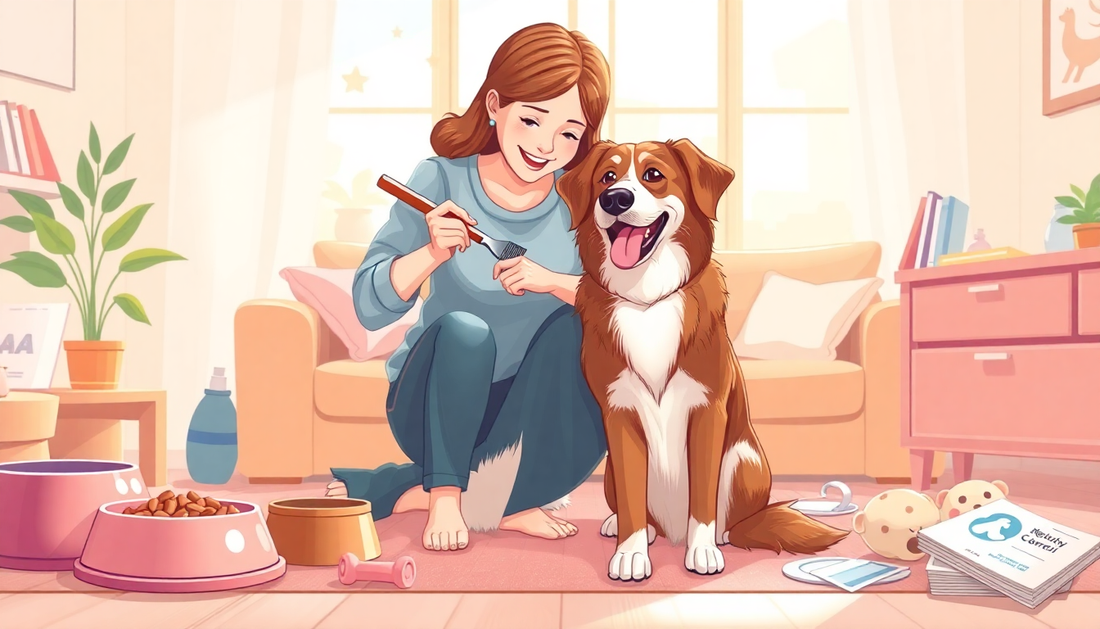
How to Keep Your Dog Healthy and Happy: A Guide to Dog Care
As a devoted dog owner, you want nothing more than to ensure your furry companion's well-being and happiness. Maintaining your dog's health is a crucial responsibility that requires a comprehensive approach. In this comprehensive guide, we'll explore the essential elements of dog care, from nutrition and exercise to grooming and veterinary care, to help you keep your Furbuddy thriving.
Nutrition: Fueling Your Dog's Health
Proper nutrition is the foundation of your dog's overall health. Choosing the right dog food can be a daunting task, with an array of options available on the market. To ensure your dog receives a balanced and nutritious diet, consider the following factors:
Understanding Nutritional Needs
Every dog has unique nutritional requirements based on their age, breed, and activity level. Consult with your veterinarian to determine the appropriate caloric intake and macronutrient balance for your furry friend.
Selecting High-Quality Dog Food
Look for dog food brands that use high-quality, whole-food ingredients and avoid fillers, artificial preservatives, and by-products. Read labels carefully and choose a formula that meets your dog's specific needs.
Transitioning to a New Diet
When introducing a new dog food, do so gradually to avoid digestive upset. Slowly mix the new food with the old over the course of a week to allow your dog's system to adjust.
Hydration and Water Intake
Ensuring your dog stays hydrated is crucial for their overall health. Provide fresh, clean water at all times and monitor their water consumption.
Exercise: Keeping Your Dog Active and Engaged
Regular exercise is essential for your dog's physical and mental well-being. Engaging your furry friend in a variety of activities not only keeps them fit but also helps prevent boredom and destructive behaviors.
Tailoring Exercise to Your Dog's Needs
Consider your dog's age, breed, and energy level when planning their exercise routine. Puppies, senior dogs, and low-energy breeds may require less intense activities, while high-energy breeds may need more vigorous exercise.
Variety in Exercise
Mix up your dog's exercise routine to keep them engaged and prevent boredom. This can include walks, runs, playtime at the park, swimming, and interactive games like fetch or tug-of-war.
Enrichment Activities
Incorporate mental stimulation into your dog's exercise routine. Puzzle toys, training sessions, and scent work can challenge your dog's mind and prevent boredom.
Safety Considerations
Always ensure your dog's safety during exercise, especially in hot or cold weather conditions. Provide plenty of water, take breaks, and be mindful of your dog's limits.
Grooming: Maintaining Your Dog's Appearance and Hygiene
Proper grooming not only keeps your dog looking their best but also helps maintain their overall health and hygiene.
Brushing and Bathing
Establish a regular brushing and bathing routine to remove loose hair, distribute natural oils, and keep your dog's coat clean and healthy.
Nail Trimming
Regular nail trims are essential to prevent overgrowth and potential discomfort. Consult your veterinarian or a professional groomer for guidance on proper nail care.
Ear Cleaning
Regularly cleaning your dog's ears can help prevent infections and maintain their overall ear health.
Dental Care
Dental hygiene is often overlooked, but it's crucial for your dog's well-being. Brush your dog's teeth regularly and consider professional dental cleanings as recommended by your veterinarian.
Veterinary Care: Ensuring Your Dog's Health and Wellness
Establishing a strong relationship with a trusted veterinarian is key to maintaining your dog's health and well-being.
Preventive Care
Regular check-ups, vaccinations, and preventive treatments, such as flea, tick, and heartworm prevention, are essential for keeping your dog healthy.
Early Detection and Treatment
Prompt attention to any changes in your dog's behavior or physical condition can help identify and address potential health issues before they become more serious.
Emergency Preparedness
Familiarize yourself with common pet emergencies and have a plan in place, including the contact information for your veterinarian and the nearest emergency animal hospital.
Conclusion
Caring for a dog is a rewarding and fulfilling experience, but it also comes with a significant responsibility. By prioritizing your dog's nutrition, exercise, grooming, and veterinary care, you can ensure your furry companion lives a long, healthy, and happy life. Remember, every dog is unique, so be sure to tailor your approach to your Furbuddy's individual needs. With dedication and a commitment to their well-being, you can provide your dog with the best possible care and create a lasting bond that will enrich both of your lives.


